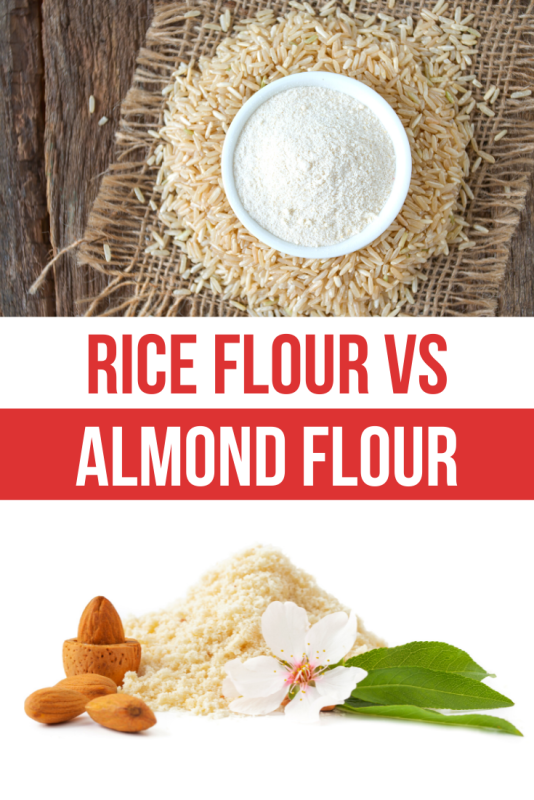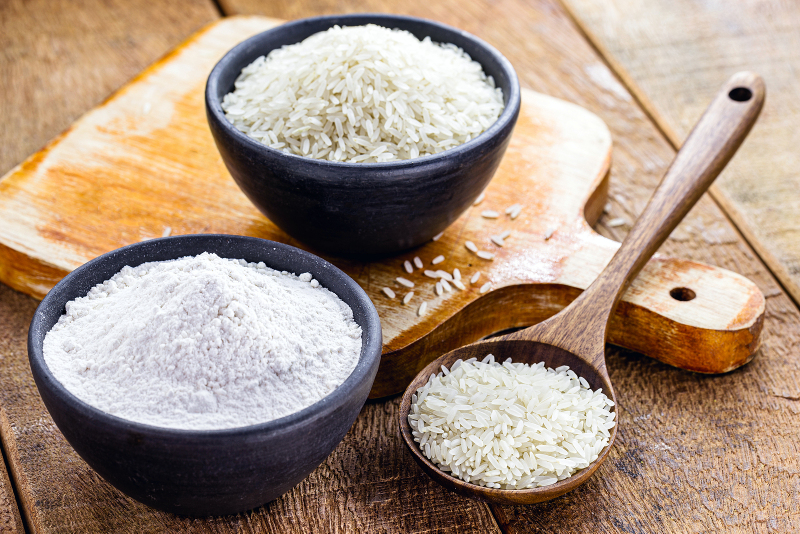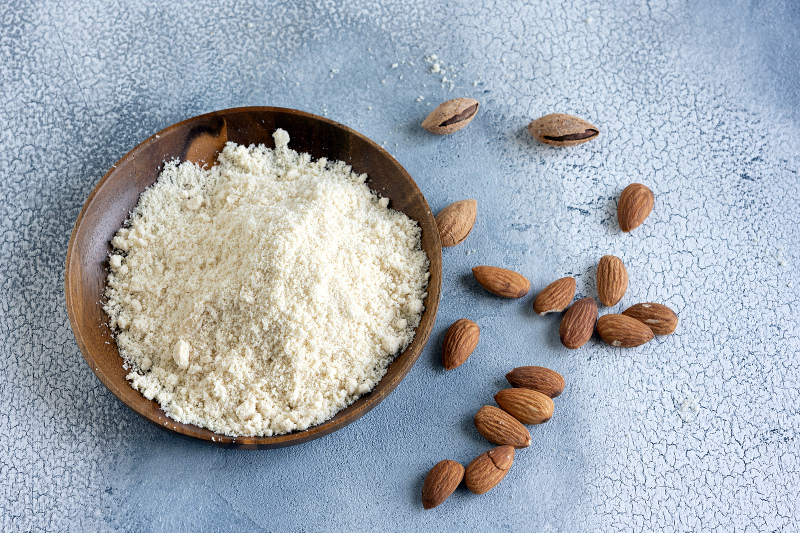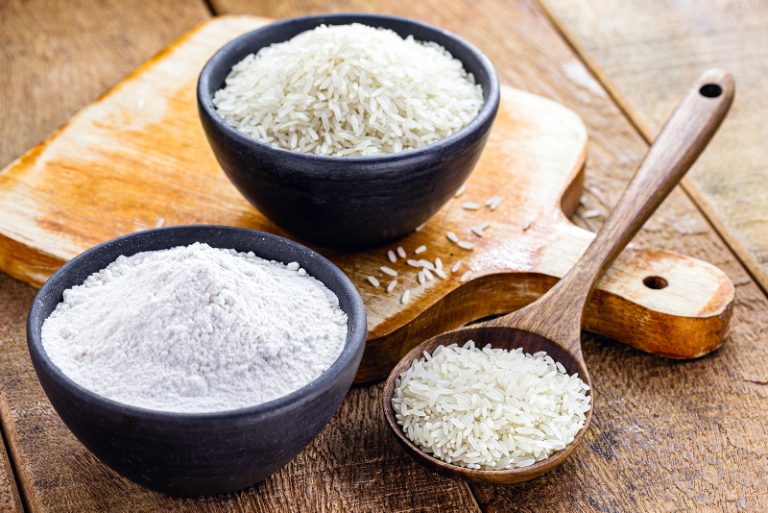Thinking about using alternate, gluten free flours in your cooking and wondering how rice flour and almond flour compare? You are in the right place!
Both of these flours can be great in your cooking and are actually easily made at home. But what are the differences? When should you use each? And can rice flour be substituted for almond flour?
In the following full guide to rice flour vs almond flour, I explain exactly what each of these flours are before comparing them, deciding which is best, when and explaining the full answer to can you substitute rice flour for almond flour?
Let’s start!

What Is Rice Flour?

Rice flour is made from ground long-grain or medium-grain white rice. This is the type of rice that is commonly eaten. This is all it is and it’s possible to make it yourself at home quite easily.
It’s gluten free and can be used in many dishes. In Asian cuisines, it’s a popular ingredient in noodles. It’s also used as a thickener in sauces or in baking.
You can purchase white rice flour or brown. The difference is just that white rice flour is made from white rice and brown rice flour is made from brown rice. They can be used interchangeably but they do have slightly different flavors and brown rice flour can take longer to cook, just like it does in its rice form.
There is also glutinous rice flour which is made from sweet rice. It is also white in color and similar to white rice flour. It does not taste sweet. Despite being called glutinous, it is also gluten free.
While rice flour can be common in gluten free baking, it’s also useful in non-gluten free baking thanks to its different texture to regular flour. It has a slightly sandy texture which can help add an extra crumbly, melting feeling useful in dishes like shortbread.
What Is Almond Flour?

In simple terms, almond flour is made from ground almonds.
But first, the almonds are skinned and blanched. This means the almonds are soaked in boiling water to remove the skins.
They are then ground which gives a very pale brown/white flour. It’s generally ground to be very fine and it has a mild flavor. It’s also gluten free.
Almond flour can be a great ingredient in denser cakes, breads and cookies. It’s protein rich so can be used in recipes where you want to add to the protein content of the food. It’s useful for people on a paleo diet.
If you are wondering if almond meal and almond flour are the same, they are not although they are similar. The difference is that when making almond meal, the skins are not removed from the almonds. This gives a coarser flour that’s a darker brown and has a more bitter taste.
Rice Flour Vs Almond Flour
So now we know exactly what rice flour and almond flour are, which is best? Who would win an almond flour vs rice flour showdown?!
What Are The Differences?
The biggest difference between them is always going to be where they come from. Obviously, rice flour is made from rice, a grain, and almond flour is made from almonds, a nut.
This gives the flours different characteristics and different pros and cons when it comes to how you might use them.
Flavor
Rice flour has a very neutral taste, particularly white rice flour making it great for dishes where you don’t want the taste of the flour to come through.
Almond flour has a nuttier taste as it tastes like the almonds it is made from. It has a toasted almond flavor in cooking.
Texture
Rice flour has a sandy texture whereas almond flour is smoother. This can be a good or a bad thing depending on what you are making.
Absorption
Almond flour is made of nuts which make it oily and it does not absorb liquid easily. Rice flour is starchy and does absorb liquid.
Calories
Rice flour has a lot more calories than almond flour. In fact, a serving of rice flour has over twice the calories of a serving of almond flour.
Carbohydrates
Rice flour is full of carbohydrates whereas almond flour has low levels making almond flour the better choice for people on low carb diets.
Protein
Almond flour is protein rich and had about four times the protein of rice flour.
Nutrition
One of the biggest differences between rice and almond flour is the nutrition they contain. Rice flour has many more essential nutrients in a serve than almond flour. There are big wins in vitamin B and magnesium in rice flour, although almond flour wins the iron and calcium content.
Brown Rice Flour Vs Almond Flour
The main difference when comparing brown rice flour instead of white with almond flour is that brown rice flour does have a taste. It’s a slightly nutty flavor although not as strong as that of almond flour.
Brown rice flour also has far more nutrition than white rice flour.
Which Is Best?
It really depends on what you are making, what nutrition and other requirements you have (like do you want low or high protein food?) and your personal preferences.
Rice flour is great for noodles and as a thickener in sauces and soups. It can also be good in baking for softer textures as long as you don’t mind the sandy texture. I recommend you buy the finest grain you can if you wish to bake with rice flour.
Almond flour is best for dishes where you want the almond taste and are baking things where you want a denser texture like cookies or crusts.
Can I Substitute Rice Flour For Almond Flour?
You can – with caution!
These flours are quite different with quite different properties, tastes and results so it’s not a generally recommended substitution and your end product can turn out quite different.
A starting point is a 1:1 substitution and, depending on the results, you may want to change this in future.
In addition to the flavor and texture differences, keep in mind that the absorbency of rice flour and lack of it in almond flour can make quite a difference depending on what you are making. Rice flour is also more elastic.
So the answer to can I use rice flour instead of almond flour is yes, but don’t expect the same results. Depending on what you are trying to achieve, the results may be better or they may be worse.
Conclusion
I hope you have found this full guide and comparison of rice flour and almond flour useful. They are both great ingredients which can be great in cooking.
Which to use really depends on what results you want and personal preferences.
Looking for another alternative to almond flour, read our guide to almond flour vs all-purpose flour here, almond flour vs cashew flour here or walnut flour vs almond flour here. You can also click here to read more guides to all the great almond products out there or here to find out how to store almond flour or here for making your own self-rising almond flour.


Comments are closed.